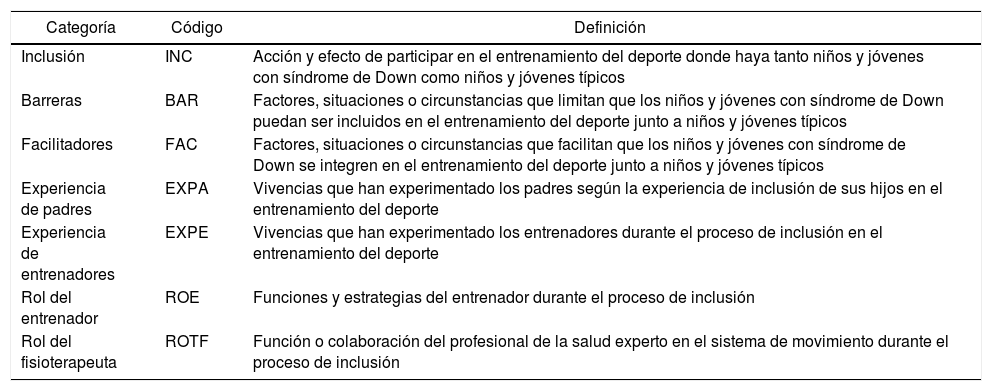Los jóvenes con discapacidad suelen ser menos activos físicamente que los jóvenes sin discapacidad y existen barreras que limitan el nivel de actividad física en su diario vivir. El propósito de esta investigación cualitativa con diseño fenomenológico fue explorar y describir la experiencia de los padres y entrenadores de equipos deportivos en Puerto Rico, en el proceso de inclusión de niños y jóvenes con síndrome de Down.
MétodoLos participantes fueron 3 entrenadores deportivos y 3 padres de niños y/o jóvenes con síndrome de Down, cuyos hijos fueran estudiantes de los entrenadores. Se llevaron a cabo entrevistas semiestructuradas en las que se encontró que la experiencia para los padres fue positiva en términos de los beneficios físicos y sociales que brinda el realizar actividad física junto con niños o jóvenes típicos.
ResultadosPudieron ser identificados diferentes barreras y facilitadores para el proceso de inclusión y los entrenadores se consideran una herramienta clave en este proceso. Los fisioterapeutas fueron identificados como facilitadores de la inclusión, por su rol como promotores de salud, desarrollo y actividad física.
ConclusionesExiste un espacio de oportunidad para la creación y promoción de más programas de deporte inclusivo, y se resaltó la importancia de que profesionales de la salud como los fisioterapeutas estén involucrados en la promoción de la inclusión y educación a los padres de niños o jóvenes con síndrome de Down sobre alternativas disponibles para que sus hijos estén físicamente activos.
Children and young people with disabilities are usually less physically active than young people without disabilities with barriers that limit the levels of physical activity in their daily lives. The purpose of this qualitative research with phenomenological design was to explore and describe the experience of parents and coaches of sports teams in Puerto Rico, in the inclusion process of children and young people with Down syndrome.
MethodThe participants were 3 sports coaches and 3 parents of children and/or young people with Down syndrome, whose children were students of the coaches. Semi-structured interviews were carried out in which it was found that the experience for the parents was positive in terms of the physical and social benefits provided by performing physical activity together with typical children or young people.
ResultsDifferent barriers and facilitators were identified for the inclusion process and the sports coaches are considered a key tool in this process. Physiotherapists were identified as facilitators of inclusion, due to their role as promoters of health, development, and physical activity.
ConclusionsThere is a window of opportunity for the creation and promotion of more inclusive sports programmes, and the importance is highlighted of health professionals such as physiotherapists being involved in promoting the inclusion and education of parents of children or young people with Down syndrome on available alternatives for their children to be physically active.
Article
Si ya tiene sus datos de acceso, clique aquí.
Si olvidó su clave de acceso puede recuperarla clicando aquí y seleccionando la opción "He olvidado mi contraseña".












